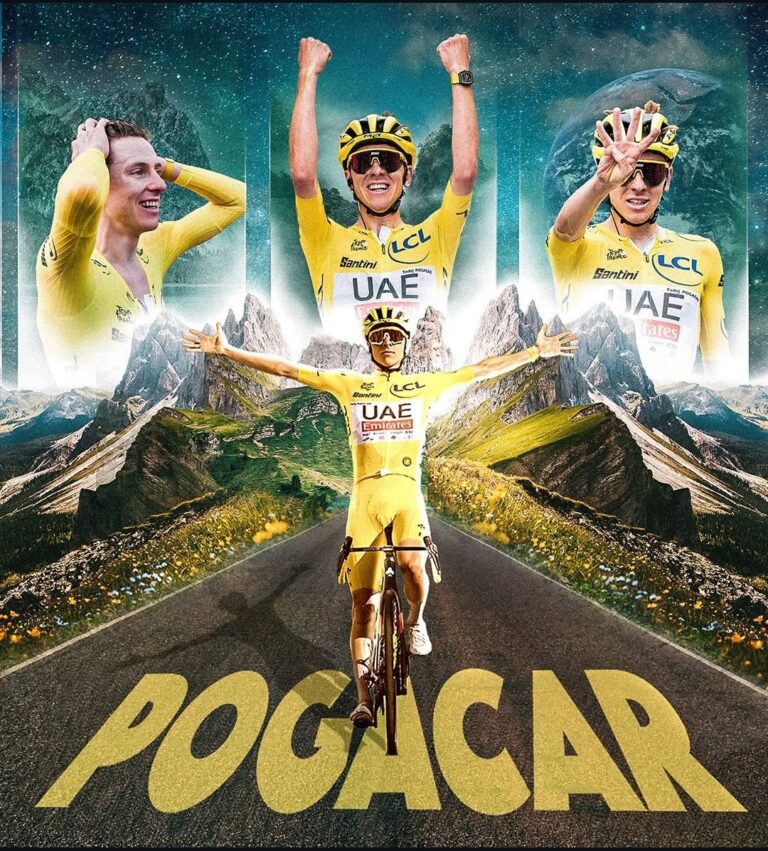At just 27 years old, Slovenian cyclist Tadej Pogačar—affectionately nicknamed “Pogi”—has already etched his name into the annals of cycling history with a dominance that evokes legends like Eddy Merckx. Born on September 21, 1998, in the small town of Klanec near Ljubljana, Pogačar transitioned from junior football to cycling at age nine, inspired by his older brother. By his early 20s, he had turned professional with UAE Team Emirates (now UAE Team Emirates XRG) and exploded onto the scene, amassing over 100 professional victories by mid-2025. His latest triumph, clinching back-to-back Tour de France titles in 2024 and 2025, marks his fourth overall win in the world’s most grueling race—a feat that ties him with Chris Froome and leaves him just one shy of the all-time record held by Merckx, Bernard Hinault, Jacques Anquetil, and Miguel Induráin. This back-to-back success, sealed on July 27, 2025, in Paris, wasn’t just a repeat; it was a demolition, with Pogačar finishing 4 minutes and 24 seconds ahead of rival Jonas Vingegaard after claiming four stages, pushing his Tour stage tally to 21.
Pogačar’s rise is a masterclass in versatility and audacity. In 2020, at the unprecedented age of 21, he became the youngest Tour de France winner ever, stunning the peloton by overturning a 57-second deficit to Primož Roglič on the final time trial stage. Remarkably, he didn’t just take the yellow jersey—he swept the young rider’s white jersey and the polka-dot mountains jersey in one go, a triple crown achievement unmatched since Merckx in 1972. He repeated this exact trifecta in 2021, cementing back-to-back Tour victories and becoming the first rider in the modern era to conquer the general classification, mountains, and youth honors simultaneously twice. These weren’t flukes; they showcased his freakish physiology—a resting heart rate of 37 beats per minute and a functional threshold power (FTP) of 415 watts—that allows him to attack relentlessly on climbs, sprints, and time trials alike.
The years 2022 and 2023 tested Pogačar’s resilience, as Vingegaard’s back-to-back Tour wins pushed him to second place both times, fueling one of cycling’s great rivalries. Yet Pogačar channeled that fire into diversification. He racked up Monuments—cycling’s premier one-day classics—with a record nine victories by September 2025. Highlights include three Liège–Bastogne–Liège triumphs (2021, 2024, 2025), four straight Giro di Lombardia titles (2021–2024, the first such streak in 75 years), and back-to-back Tour of Flanders wins (2023, 2025). In 2024 alone, he added Strade Bianche, Milan–San Remo, and La Flèche Wallonne to his palmarès, proving he’s as lethal on cobbled hell or Italian hills as he is in Grand Tours.
No discussion of Pogačar’s feats is complete without 2024, arguably the greatest season in modern cycling history. He stormed to victory in the Giro d’Italia—his first—claiming six stages and the maglia azzurra mountains jersey, then pivoted to the Tour de France for a double unseen since Marco Pantani in 1998, winning by nearly six minutes with six more stages. Capping it off, he soloed to gold at the UCI Road World Championships in Zurich with a 100-kilometer attack, becoming only the third man (after Merckx in 1974 and Stephen Roche in 1987) to claim cycling’s Triple Crown: Giro, Tour, and Worlds in one year. Uniquely, he paired it with two Monuments that season, a first in history. By 2025, he defended his Worlds title ambitions while adding the Critérium du Dauphiné and a third Liège win, all while holding the UCI world No. 1 ranking for a record 219 weeks.
What sets Pogačar apart isn’t just the numbers—104 career wins, including 30 Grand Tour stages—it’s his style. He races with a “stupid instinct” for attacks, turning conservative pelotons into spectacles of chaos and joy. Experts like five-time Tour winner Hinault have called him “like me and Merckx,” while El País dubbed him “the Cannibal 2.0.” At 27, with the Vuelta a España still unclaimed and potential for a fifth Tour in 2026, Pogačar’s trajectory suggests he’s not just holding records—he’s rewriting them. In a sport of endurance and heartbreak, he’s the rare force who makes the impossible feel inevitable.
